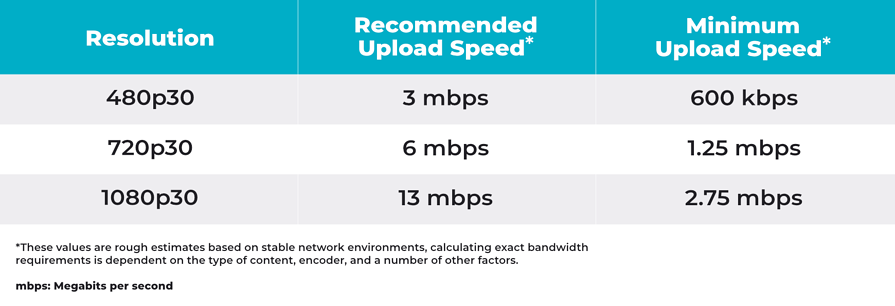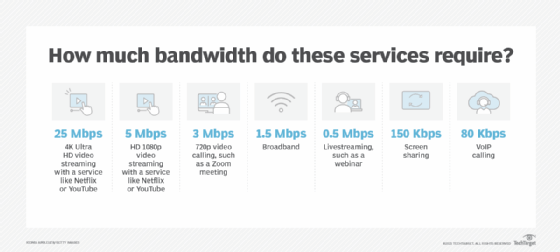Why Megabits Per Second Matter for Remote Job Effectiveness
Why Megabits Per Second Matter for Remote Job Effectiveness
Blog Article
Just How Megabits Per Second Effect Your Online Activities
The principle of megabits per second (Mbps) plays a crucial role in forming our on-line experiences. Greater Mbps can boost performance and decrease interruptions, while insufficient speeds may foster disappointment and inadequacy.
Recognizing Megabits Per Second
When thinking about web rate, it's necessary to understand the principle of megabits per second (Mbps), which offers as a standard measurement for information transfer prices. This metric quantifies exactly how much information can be transferred over a net connection in one second, giving a clear understanding of performance abilities - Megabits Per Second. For context, one megabit amounts to one million bits, and Mbps is generally made use of to reveal bandwidth for different online activities
A greater Mbps indicates a faster internet link, enabling users to carry out tasks such as downloading data, browsing web sites, and participating in on-line gaming much more efficiently. As an example, typical browsing requires around 1-5 Mbps, while streaming high-definition video clip might require 5-25 Mbps. Understanding these demands is vital for figuring out the appropriate internet speed required for details activities.
Additionally, the number of tools attached to a network can affect general efficiency. Several customers streaming, pc gaming, or downloading and install concurrently can stress offered data transfer, causing slower rates - Megabits Per Second. Reviewing individual online habits and requirements is vital in picking a web strategy that aligns with one's demands, making sure a smooth electronic experience
Streaming and Buffering Issues
Streaming high-definition material has actually ended up being a staple of modern online amusement, yet it is frequently accompanied by frustrating buffering issues. These disturbances can dramatically diminish the checking out experience, causing discontentment and possible loss of target market involvement. Buffering takes place when the data transmitted from the streaming service is not gotten quickly enough to preserve a smooth playback, usually because of inadequate net speed measured in megabits per second (Mbps)

Additionally, real-time streaming can be affected by network congestion, which takes place when several tools share the same transmission capacity. Enhancing connection speed and guaranteeing sufficient Mbps is essential for a seamless streaming experience. As streaming solutions remain to evolve, understanding the impact of Mbps on buffering concerns stays important for consumers seeking nonstop amusement.
Online Gaming Performance
The impact of web rate on on-line tasks prolongs beyond streaming, considerably affecting on the internet gaming performance. In affordable video gaming, low latency and high transmission capacity are essential for a seamless experience. A fast connection decreases lag, permitting gamers to respond quickly to in-game events, which can be the difference in between triumph and defeat.
Data transfer, measured in megabits per second (Mbps), plays an important function in sustaining several gadgets and gaming platforms all at once. Not enough transmission capacity can result in dropped links or minimized video game high quality, adversely affecting gameplay. On the internet multiplayer video games need substantial data transfer, specifically throughout peak gaming hours when numerous gamers are online.
Additionally, the sort of video game can also dictate the necessary net speed. Hectic first-person shooters require higher speeds to keep responsiveness, while turn-based technique video games might operate reasonably well on reduced speeds. As on the internet gaming remains to progress, with increasing graphical fidelity and even more complex multiplayer atmospheres, the need for greater Mbps will just magnify. As a result, players ought to guarantee they have sufficient internet rate to boost their gaming efficiency and overall experience. Buying a robust net link is necessary for gamers wanting to optimize their efficiency and pleasure.
Video Conferencing Top Quality
In today's digital landscape, video clip conferencing high quality is heavily affected by web rate, particularly in regards to data transfer and latency. Top quality video clip calls need enough data transfer to send audio and video clip data flawlessly. Generally, a minimum of 1.5 Mbps upload and download speeds is advised for standard definition video clip, while high-definition video clip conferencing usually demands at least 3 Mbps.
Latency, or the hold-up in between sending out and obtaining information, additionally try these out plays a critical function in the customer experience. Reduced latency ensures that conversations flow normally without uncomfortable pauses or disruptions. Ideally, latency must be listed below 150 nanoseconds for efficient communication. Greater latency can result in echo, lag, and special info disjointed interactions, which can impede cooperation and involvement during meetings.
Additionally, several participants in a video conference can stress offered data transfer, necessitating also greater rates. Network congestion, commonly caused by synchronised activities like streaming or downloading, can further weaken video clip top quality. Therefore, for companies relying upon video clip conferencing for remote cooperation, comprehending the partnership between megabits per general and second communication top quality is necessary for preserving productivity and boosting virtual interactions.
Choosing the Right Web Plan
Selecting an ideal net strategy is vital for ensuring optimal efficiency in different online tasks, especially in setups that require high data transfer, such as video clip conferencing and online video gaming. Megabits Per Second. When taking into consideration a web plan, it is important to assess both the speed and information allocation to match your particular use requirements
For homes with multiple users taking part in simultaneous activities, a plan providing higher megabits per second (Mbps) is advised. Typically, a minimum of 25 Mbps click to find out more is appropriate for conventional streaming and browsing, while strategies going beyond 100 Mbps are better for even more extensive tasks. In addition, think about the nature of your online activities; video conferencing requires at the very least 1.5 Mbps upload rate, while on the internet gaming may require a reduced latency yet constant connection.
Endless information strategies can avoid throttling and disruptions, specifically if hefty usage is anticipated. By thoughtfully selecting a net plan customized to your needs, you can boost your on-line experience, making certain smooth, continuous access to your recommended tasks.
Final Thought
Finally, the importance of megabits per second (Mbps) in forming on the internet activities can not be overstated. Greater Mbps facilitates seamless streaming, decreases buffering, enhances pc gaming experiences, and ensures high-quality video conferencing. On the other hand, poor transmission capacity can bring about frustrating disruptions and diminished efficiency throughout various jobs. A detailed understanding of specific or household Mbps requirements is crucial for selecting a proper web plan that appropriately supports diverse online activities and customer needs.

Normally, a minimum of 25 Mbps is ideal for conventional streaming and browsing, while plans surpassing 100 Mbps are better for more intensive tasks. Additionally, think about the nature of your online activities; video clip conferencing calls for at least 1.5 Mbps post rate, while on the internet pc gaming might require a lower latency but regular link.
Report this page